Thursday August 11, civil protection rescuers extracted two dead bodies found near Bihongo waterfall in Nyabisiga rural area. The area is situated in Bugarama zone where Jean Bigirimana disappeared.
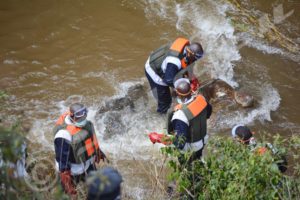
Civil protection rescuers attempt to recover the second body from the Mubarazi.
At 12, first aid workers of the civil protection police unit arrived at “Concasseur”, the meeting place where they were waited for by their colleagues from Muramvya.
It is from there that they headed towards the Mubarazi river valley. “Those civil protection first aid˗workers got all necessary material from the Red Cross. They had to hurry up so the work could start on time. The spotting was done last Tuesday. Only the execution remains”, said one Red Cross agent in Muramvya.
To the spot, together with journalists, there were the CNIDH (National Independent Commission on Human Rights) agents, the Public Prosecutor in Muramvya, a delegation of the High Commissioner Bureau for Human Rights (OHCDH) and many human rights defenders who had come to take part in the expedition.
There were three people from Gituro area of Kamenge zone in Bujumbura the capital who were there to see whether the bodies were not their relatives who had disappeared a month before. They were young men who were about to get married. They earned their living by buying and selling cows.”
Interestingly, when asked separately, those people did not agree on the districts of origin of their relatives. The first said they were from Gisozi district of Mwaro province. The other insisted that the missing relatives were natives of Rusaka district of the same province.
Journalists took the lead towards the valley because many of them already knew the way towards the Gatamera hill where the dead bodies were.
The first body was discovered by Iwacu journalists on Sunday 7 August. The other was discovered two days later during a verification and location mission right beside the first one.
At the back of the procession were civil protection rescuers, well-equipped and heavily laden with stretchers and buckets full of disinfectants in their hands and body bags to wrap the corpses in. Several police officers who were deployed supervised the procession to ensure security. The few local inhabitants met by the team glanced at the commotion. They remained distant and suspicious. They did not want to be involved in the matter.
Many people in the team were careful to take tall walking sticks to lean on before going down towards Gatamera. The slope was too steep. If anyone tripped over, they would tumble down for sure.
Police officers who went off and scouted around had machetes to cut shrubs to clear the way for reaching the river. A police officer with a mine detector led the squad.
At 1 pm, the civil protection spokesman, OPC I, Evariste Ndikumana ordered everyone to stand on the sidelines and told the first aid workers to go down to the river. The first one rushed with a tall stick that he used as gauge. His plastic shoes hindered him from moving freely towards the first corpse stuck between stones in the river.
At the second attempt, the rescuer stumbled. Everyone was slightly frightened. The current was strong and there was a cascade below. Finally, he succeeded to grip some stones and then stood the rock that blocked the dead body discovered on Sunday.
Some time later, a second rescuer joined his colleague. Then, they sprinkled the lifeless body with disinfectants before wrapping it with a rope to drag it from water. They moved it with a piece of wood and their colleagues who had stayed by the river retrieved the corpse.
Great surprise
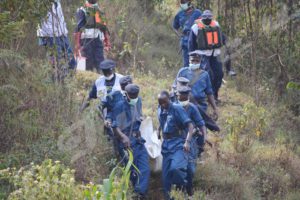
Police officers carrying one of the bodies to the main road.
The body was with no head. “That person was beheaded before being thrown into the river. He is tied up and naked.
Executioners did not want him to be identified”, said one human rights activist who was there to witness what had happened.
The body was then quickly wrapped up in the body bag.
All the police officers, human rights activists, as well as journalists were asked to line up to drag that corpse to some thirty meters away from the river.
The civil protection spokesman put everyone to work. In a matter of half an hour, the first corpse was retrieved from the Mubarazi river and laid on the grass before another body that shared the same misfortune was taken from the water.
At 2 pm, attempts to fish out the second body were still going on. It was not an easy task. There was too much foul smell despite the disinfectants sprinkled on the first and the second bodies. The second body was blindfolded and tied up. The task was hard as the rescuers tried to move the body to the river bank.
The body seemed heavy, something held it back. Rescuers who remained beside the Mubarazi pulled hard and discovered that the bound body was tied to a bag full of stones. The victim had been weighted with stones. Rescuers lined up to pull this second body out of the river.
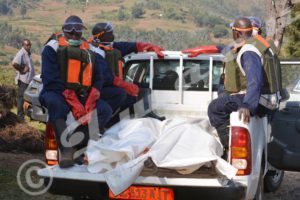
Both bodies embedded in a civil protection pick-up were sent to Muramvya hospital morgue.
“Probably this poor guy was executed and then thrown from the top of the cliff located on the other side of the Mubarazi on Burambana hill with this jumper full of stones tied to its feet,” suggested another human rights defender.
Curiously, the two people supposed to have come to identify the body and see if there were not the bodies of their missing relatives left before the second body was pulled from water and placed next to the first. They slipped away wordlessly.
Perhaps they were informants? Nobody knows.
Some curious people from the surroundings came to witness this, but from afar. Called to help carry the bodies on stretchers to the road, few people preferred to scamper and disappear in nature.
Everyone, rescuers, police officers, journalists, human rights defenders, CNIDH agents, took turns to bring these two bodies. Instead of going through Nyabisiga hill, they took a different path. They moved along the Mubarazi up until the tarmacked road.
Around 3:30 p.m., the two bodies were loaded onto a Civil Protection pickup. They were brought to Muramvya hospital morgue.
In his brief statement, the spokesman of the police rescuers unit and mortal remains management expert at the same time indicated that there was still a “difficult task of identifying the two bodies.”
A doctor at Muramvya hospital deployed on the field said it will be difficult to identify these two bodies. “They are in advanced decomposition; one of them has no head while it could provide much information. The first layer of the skin is gone and all that makes the physical identification difficult, “said Dr. Nestor Ndayisaba. According to him, all that remains is the use of a little more advanced methods like the DNA in order to identify the two bodies.
One of the civil protection agents who had participated in the spotting mission of these two bodies on Tuesday along with Iwacu journalists said he noticed an “attempt to move or push the headless body towards the fall at the bottom.”
Flashback to earlier days
Iwacu returns to the field search operations that led to the discovery of two bodies in the Mubarazi, the area where, according to several sources, the journalist Jean Bigirimana would have disappeared.
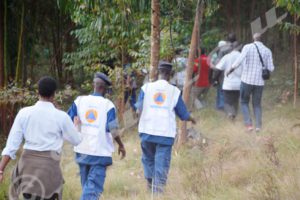
In single file, Iwacu journalists, members of the CNIDH and police civil protection down to the valley
On Friday, the team of Iwacu journalists was sent to the field. They returned empty-handed from the edges of the Mubarazi, where information reported the disappearance of the journalist. The night hindered their investigation.
Saturday, to their surprise, Iwacu journalists found on the field officials, the CNIDH, police officers, a prosecutor and agents of the intelligence service as well. This official and “joint” search did not work. For Iwacu, they were not in the investigation but in communication. And then the information became scarce that day. Journalists noted that the population was apparently afraid to speak.
On Saturday, once again, Iwacu reporters returned empty-handed, but with some information gleaned without this important delegation knowing.
They also returned convinced that inhabitants of the area knew many things, but that they would speak discreetly.
Sunday, back on the field. Iwacu journalists were alone this time. And then they discovered the body. Without proper equipment, and without the possibility of approaching a little more, they returned with this distant image of a body blocked by stones in a river.
The information was transmitted to the CNIDH and published.
Here it is important to remember the smear campaign of the work of journalists observed in some milieus. The police spokesman denied even the discovery by Iwacu journalists, saying that for the police, there was nothing, no body had been found in that area.
We instead salute the involvement of CNIDH which, unlike the police, agreed to carry out a verification descent on the ground.
Back on the field….
Tuesday at 10am, Iwacu journalists were informed that a delegation of the CNIDH was ready to go to the Mubarazi River.
Around 1pm, the team of Iwacu Press Group journalists set out to Muramvya.
Along the way, the journalists received a call from a Deputy Commissioner of the Judicial Police in Muramvya asking them to go to his office in Muramvya. They obeyed.
At Muramvya province chief town, they were joined by the chief of intelligence service of Muramvya province. Half an hour later, a stamped CNIDH vehicle arrived. There, remained only the civil protection team to go down to the Mubarazi.
At 4pm, the latter arrived, some of them got on the pickup of the chief of the intelligence service in Muramvya. As there were not enough places, others got on the CNIDH vehicle.
The team decided to take the road without the Red Cross. “In any case it is too late, on this Tuesday we will only do the location scouting and evaluation of work ahead of us,” said one of the civil protection police officers apparently disappointed by the absence of the Red Cross.
“We are not equipped to remove the bodies from the river. We need appropriate equipment for this kind of work. We do not even have special bags to pack the body. When such cases arise, we turn to the Red Cross to help out,” said another agent of the civil protection police.
Was the body still there?
It was 4:30 p.m. when the team decided to continue the rest of the way on foot. Vehicles were parked at the place commonly called “Concasseur ”.
After half an hour walking in single file, the descent to the Mubarazi began.
Iwacu journalists went ahead “It is you who know the place, you have to show us the way,” said the Deputy Commissioner of the Judicial Police in Muramvya.
We had to hurry up because it was getting late and the night falls quickly in those parts.
They all began to walk down the Nyabisiga hill of the Bugarama area towards the Gatamera hill where the Iwacu journalists saw the body stuck between the stones, close to the so-called Bihongo fall.
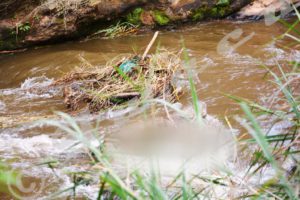
Hidden by stones, a second body that journalists had not noticed on Sunday
At Iwacu, everybody was concerned. “This body found and photographed on Sunday, is it still there?” wondered the journalists. And suddenly, everyone was frozen .It was always there! At the bottom of the ravine. Still. Hands raised to the sky as if imploring mercy.
In the group, the silence was deafening. We just heard the sound of the Mubarazi flowing water, indifferent. “It must be identified”, whispered the journalists who seemed to lead the operation. All decided to go down to the river to see up close the corpse. The police went first. Each step was taken with care: that fall could be mortal.
The slope was steep.
Suddenly journalists who remained upstream came to realize, not far from the body, another strange form in water. They called out to the team down and discovered another dark mass in the Mubarazi.
Surprise. Getting closer, the journalists and civil protection police officers identified a second body! It was tied up and decaying, like the first.
The journalists took a few photos of the bodies, images that we decided not to show. They were horrible.
Iwacu reporters remembered that the surrounding population spoke of “11 bodies wrapped in bags that they saw in the very place a few days ago.” How many bodies are there in the corner? This is the question that everyone asked.
In the evening silence, journalists, the police and the CNIDH delegation were all watching wordlessly these rotten bodies.
The police and civil protection agents had no equipment. They decided to return on Wednesday accompanied by a Red Cross team.
“It is they who are specialized for this kind of work. They are equipped. We will collaborate”, said one of the civil protection agents.
Without a word, everyone took their way back in single file. In the dusk, casting a last glance at the bottom of the ravine through which flows the Mubarazi, we could see these two bodies, still as if they were waiting for deliverance.
At Jean’s home, a pessimistic expectation
After 21 days of the disappearance, the tormented family is still waiting for Jean Bigirimana, the spouse and father to come back home.
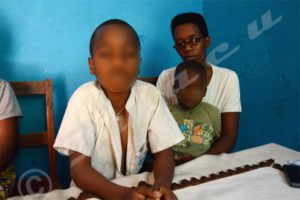
Jean’s family in anguish
Bigirimana’s spouse is anguished, with a haggard look. We met her at home in Kamenge on 11 August. She said that she had been living mechanically those three last weeks. A maxim: “Be strong, especially not to crack.”
Godeberthe Hakizimana wants to be strong for herself, for her children and for Jean that she has been expecting since the last three weeks up until now.
To remain strong for her to avoid going crazy. Crazy with anxiety, confusion especially when listening to the radio that announces all the time the news about the bodies found in the Mubarazi river.
Shattered as well by rumors and speculations about the disappearance of her husband spread everywhere.
This mother, aged 28, must also be strong for her children: Don, 8 and Timmy, 3 years. For one reason: it is the first time that their father has gone for so long from home. “Timmy regularly asks that we keep aside food for his father,” said Mrs.
Bigirimana. “Dad must have something to eat when he gets back,” often repeats the kid.
The young mother said that children only stop asking her about their father when they are playing with other kids during the day. “The night is more difficult. Timmy, the little boy, often starts crying, asking where his father is”, says Mrs Bigirimana who certainly does not want to be distraught with grief in front of her children.
Children affected by their father’s absence
But the elder, Don (8 years) is not fooled. He feels the anguish of his mother. “Timmy! Do not bother Mum. Don’t you see that she has many problems?” He often advises his little brother when he becomes uncooperative.
According to his mother, since the disappearance of his father, Don has become accustomed to turning in on himself to meditate in his corner. When asked what he thinks, all that he replies is: “Nothing! »
Mrs. Bigirimana also says she wants to be strong for her husband and father of her children. She wants Jean to be proud of her when he finally comes back home and feel that his wife has coped with the situation and has done her best to hold out.
She says receiving the support of her mother who left Karago Mountains in Cankuzo (Eastern province) to come to assist her.
The mother of two kids feels comforted by this mobilization on the case of her husband. “Seeing Iwacu and all these people mobilized in the search of my husband reassures me”. She states.
However, Mrs. Bigirimana feared ending up in a precarious financial situation very soon. «It is Jean who fed the family. I wonder how I’ll pay the rent and continue to support my children.” She said that she took the decision to postpone for later her registration at the University of Burundi.
Despite all that, Jean’s family doesn’t give up hope. She appeals to the kidnappers to release her husband and father of her children. “If my husband made mistakes, may he be brought to justice, we at least need to know his whereabouts”.
Godeberthe or “Gode” to her relatives, lives with the hope of seeing her husband back soon: «Whenever a vehicle parks in front of our gate, I run to see if it is my spouse who returns home”.

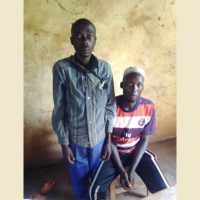
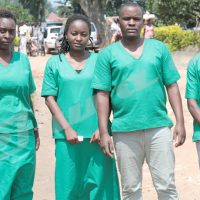
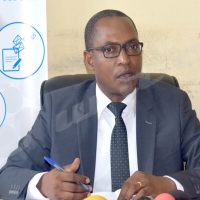

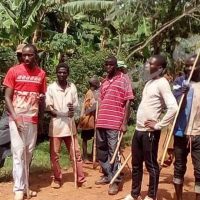













 IWACU Open Data
IWACU Open Data

